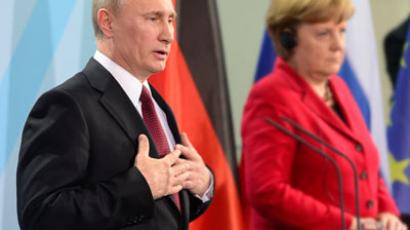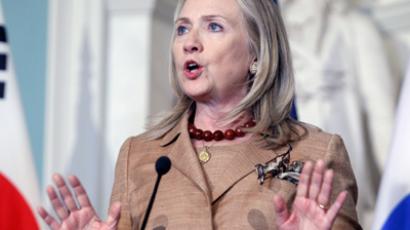Poker-faced meeting: Putin, Obama avoid pushing sore points
Presidents Putin and Obama seem to have found some common ground on Syria and have pledged to continue dialog on the controversial European missile shield, but despite the optimistic rhetoric many issues between the two states remain unresolved.
After spending two hours behind closed doors on the sidelines of the G-20 meeting, the presidents stated that they had “agreed” that they need to see a “cessation of the violence,” in Syria and that a “political process has to be created to prevent civil war.” There was no mention of any tougher sanctions on Syria or a reiteration of demands that Bashar al-Assad should step down.“We have found many common points on this issue,” Putin said, adding that the two countries would continue their discussions. Both leaders are united in their belief that “the Syrian people should have the opportunity to independently and democratically choose their own future." Beyond Syria, Obama and Putin discussed various issues, including the divisive European missile shield and the confrontation with Iran over its nuclear program. The presidents said they looked forward to constructive engagement with Iran through the P5+1 process, with Obama adding that there was still time and space for a diplomatic solution.Another hot topic on the agenda was the notorious Magnitsky Act, which implies the imposition of sanctions such as visa bans and asset freezes on a number of Russian law enforcers and officials. Both sides are fully aware that the approval of this bill would imminently lead to retaliatory steps from Russia. Meanwhile, a reworked and apparently watered down draft of the bill is circulating in the Senate, with some of the names having been relocated into a classified annex for the national security interests of the United States, Reuters reports.The dialog between the presidents was open and apparently beneficial, according to Kremlin Press Secretary, Dmitry Peskov, who said “The presidents didn't evade difficult topics but the meeting was marked by the idea that differences shouldn't become obstacles in the way of the development of bilateral relations.”In order to continue the constructive dialogue, Putin has extended an invitation to Obama to visit Moscow. The US president said he was looking forward to visiting Russia and in return invited Putin to pay the United States a visit.But despite the optimistic rhetoric at the meeting, the Obama administration is unlikely to change its stand on many issues, including Syria, a former member of the Reagan administration, Paul Craig Roberts, told RT.“I am convinced that Putin does not want a conflict with Washington. He wants to resolve the issue of the missile bases that are surrounding Russia, he does not want conflict. And Obama, he does not want any conflict either. But he is just a member of the government that wants regime change in Syria. And Obama is not exactly in position to be able to stop that.”“Obama will do what he can to get along with Putin, but still has to represent the agenda of regime change,” Roberts added. “And the situation I think is unresolved.”














